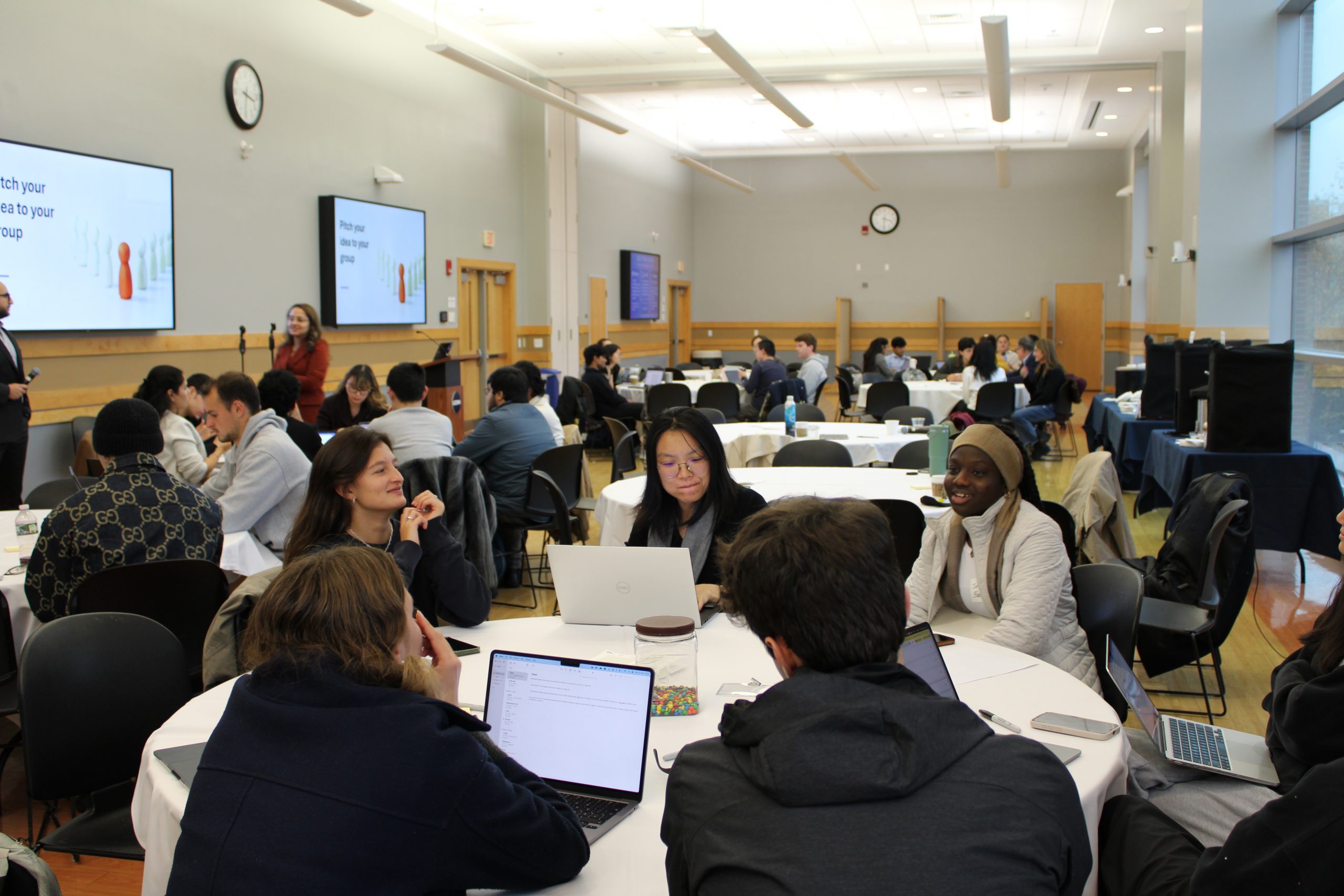1. What are you getting your undergraduate degree in and why did you decide to pursue that field of engineering?
I am getting my undergraduate degree in Chemical Engineering. I chose chemical engineering because I believe it is one of the broadest backgrounds and skillsets one can have to understand complex processes and solve current or future global problems. I thought a degree in chemical engineering would prepare me for several exciting and fulfilling careers in research, engineering, patent law, business, or even policy decisions. In fact, whether I wanted to work in a lab or at a refinery, or in an office space, I believed the rigor of the chemical engineering curriculum would have prepared me for whatever I decided to do after college.
2. Are you coming to UConn to get your Ph.D. and is Exxon Mobil funding that? What were the other places you got into?
Although I have thoroughly enjoyed my time here at UConn, I thought for me to grow even more as a scientist and engineer it would be beneficial to take on a new challenge and begin a new chapter in my life at a separate institution. I have learned a lot from the Chemical Engineering Department during my time here, and I am looking forward to translating the fundamental engineering principles taught to me and my cohorts to my graduate studies.
So yes, I have been selected as an ExxonMobil Future Leader’s Academy Ph.D. Scholar. This rare and unique fellowship award provides financial support to cover my tuition, fees, other educational-related expenses, and a stipend as I pursue my doctoral degree at any accredited university. It also provides the opportunity for me to continue my research work with the company when appropriate. In fact, I will be conducting my third assignment with the companies’ Emerging Energy Sciences Section this upcoming summer.
I am truly blessed and humbled to have been accepted to all ten institutions for which I applied for admissions into their Ph.D. program for Chemical Engineering. This achievement is something that I never thought was possible knowing all the adversities I had to face in my life.
I have received acceptances into the following graduate programs:
The University of Texas-Austin, Georgia Institute of Technology, University of Wisconsin- Madison,
University of Illinois – Urbana Champaign, University of Michigan- Ann Arbor, Northwestern University, UPenn, Rice University, Texas A&M University, and the University of Florida.
3. Talk about your time here. How did you grow as an individual? What things were you involved in and how has UConn Engineering shaped you as an adult and an engineer?
Well, my time at UConn Engineering has been one about self-discovery. Being an immigrant and minority in STEM, my time at the university has been one of change, acceptance, and overcoming challenges. Challenges that tested me intellectually and allowed me to grow as an aspiring researcher and engineer. After graduating high school, I assumed that I was ready for the “real world.” Honestly, I had never been more wrong. I wasn’t prepared for the responsibilities that would fall upon me. I wasn’t ready to meet so many people from different backgrounds whose opinions and strengths were so different from mine. Quite frankly was not prepared for the world in the way that I thought I was, and that was terrifying.
But my fear of transitioning to such a large university was lessened through my involvement in the 2017 BRIDGE Program. This summer program prepared me for the rigors of the engineering curriculum at UConn, provided a support system of students through my entire college experience, and introduced me to leadership opportunities within the UConn National Society of Black Engineers (NSBE) Chapter and in Engineering Ambassadors. It has been an honor to serve as the Chapter President last academic year and as the Vice President of Analytics for EA for 2018-2019. Besides having served on both organizations’ executive boards, I was also heavily involved in the LSAMP and McNair Scholars Programs, which provided mentorship, research opportunities, professional development workshops, and seminars to prepare me for graduate school. Lastly, I have also served on both executive boards for Omega Chi Epsilon and Tau Beta Pi Engineering Honor Societies as President and Vice President, respectively.
Outside of my involvement in student organizations, I am also an undergraduate researcher in Professor Wagstrom’s Computational Atmospheric Chemistry and Exposure (CACE) lab working on estimating the societal cost of residential heating options in the United States. When not occupied with my research project, I also serve as an undergraduate teaching assistant for three courses: Foundations of Engineering (ENGR 1166), Fluid Mechanics(CHEG123), and Process Kinetics (CHEG 3151).
While college was a challenging time, it has also taught me some very good lessons. It has taught me that hard work and dedication will make up for what you lack in natural ability. It has taught me that patience is absolutely critical when solving complex problems as 9/10 times things won’t work the first time you try something new, and it taught me that it’s ok to fail, make mistakes, and admit when you don’t know something. It became evident that learning from my failures has allowed me to discover new paths and motivated me to do better and achieve my career goals. In short, UConn has taught me that success in whatever we do boils down to our attitude and effort.
4. What’s your goal after you finish your Ph.D.? Do you want to be a professor, or do you want to do something else?
Beyond the completion of my Ph.D. in Chemical Engineering, I plan to make a lasting impact on others through the work I conduct. Whether my career ultimately resides in academia or industry, I desire to help reduce our carbon footprint by developing the next generation of catalysts for sustainable technologies. I also strive to be a positive, knowledgeable, and compelling leader in the field of STEM whose passion and talent will bring about change within my community, inspire those who look like me, and continue to push the boundary of science and engineering.
5. Who has been your mentor or mentors during your time at UConn? How did they help you?
I have been fortunate to have been mentored by two incredible faculty and staff at the university.
Dr. Kristina Wagstrom and Dr. Renee Gilberti’s guidance and tips have helped me realize my potential and push me to become a better student. When anything has come up, they have always been open and willing to sit, discuss, and provide their insights and views on any particular topic—just knowing that I had few persons who I could to go to made my time at UConn easier.
6. Did you always want to go into engineering? What inspired you? Did you have a teacher growing up that you looked up to or a family member or friend?
It is funny that you asked that I have convinced myself that I would pursue a career in medicine growing up. While growing up, becoming an engineer wasn’t a career path that I saw to be common in Jamaica. The main career choices that I would hear about as a student were the possibilities of becoming a medical doctor, a lawyer, teacher, accountant, police officer, or even joining the military. Hence, I didn’t really know what engineers do on a day-to-day basis.
I just knew that I always loved math and science and that those courses were primarily my strongest subjects in high school. But the question remains, why engineering? There was indeed a specific mentor/role model in my life who inspired me to study chemical engineering. In 10th grade, due to my academic performance, I was recommended by my previous math teachers to enroll in a more advanced math course called Additional Mathematics. In that particular class, I had a teacher named Shaven Hendricks, an alumnus of Ardenne High School — my alma mater — who was also a chemical engineer by profession. His teaching methods and enthusiasm for the subject coupled with learning about his previous projects as an engineer, increased my passion for science even more, and cemented the idea that I wanted to be a chemical engineer and make an positive impact on someone’s life.
7. What are you looking forward to the most as you embark on this new graduate school adventure?
I am ecstatic to be joining a community of scholars in the field of emerging sustainable technology and work collaboratively with like-minded individuals and faculty experts to solve current and future energy problems. Along my graduate school adventure, I hope to share my experiences and mentor undergraduate students similar to how I have been mentored while at UConn. Lastly, I am also looking forward to my graduate school journey equipping me with the necessary skills and experiences to have a successful research and engineering career.



